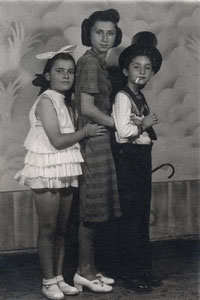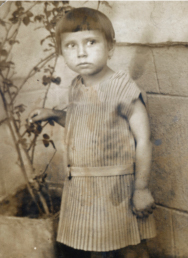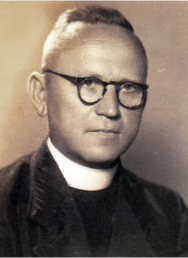
Sofi Danon-Moshe
Pazardzhik, Bulgaria
Interviewed in Sofia in 2004 by Svetlana Avdala
Historical note: 48,000 Jews lived in Bulgaria before the Second World War. 48,000 were there after the war. During those years, however, Bulgaria annexed neighboring Macedonia and the Greek region of Thrace. From those territories the Bulgarian police deported 11,000 Jews to their deaths. Starting in the late 1930s, the Bulgarian government passed one law after another against Jews, eventually stripping them of their assets and forcing them to wear a yellow star. Sofi Danon lived in a small Bulgarian city and remembers the night of her school’s prom—or ball, as she refers to it.
Read the biography
View the family pictures here.
“It transforms everything into fear, there's always that fear, that neurosis that something bad would happen.”
The principal of our school, Mr. Hadzhitodorov, was very liberal and I was his favorite student. At that time it was a custom to organize balls. My first ball was in the sixth grade. It took place in the building of the Girls' High School. There were only girls. But when we were finishing school in 1942 the principal decided to make one single farewell ball for the Boys' and the Girls' High Schools. It took place in the ‘chitalishte.'
Jews weren't allowed to walk on the street that was leading to the ‘chitalishte.' That was a main street and in the big hall of the ‘chitalishte' there were drama performances, concerts, and we were forbidden to attend all those events. But I asked the principal, ‘Shall I come to the farewell ball?' and he said, ‘But, of course!'
I needed a beautiful dress, as I didn't want to go in my flannelette dress and the black apron. Mother sewed a dark blue dress for me with a silk ribbon that was blue, too, and a white belt. That was my ball dress. Of course, I had to put on the yellow star. I went to the ‘chitalishte' with my friends. At a certain point I noticed that the boys from the Boys' High School had gathered in a corner and were pointing at me. I slowly made my way to the principal and told him, ‘Something's happening, Mr. Principal.' ‘It's nothing. Stay here next to me.' And the boys, all of them together, started coming in my direction and said, ‘Hey, you, the Jew, get out of here!' The principal whispered in my ear, ‘Don't move from here!' And I remained there.
A police officer came in five or ten minutes. He came into the room and immediately moved in my direction. He was wearing a cloak and had a sword. He was so tall and was coming towards me in giant steps. ‘Are you a Jew? Come on, get out!' And the principal couldn't say anything, poor man. The police officer just told him, ‘She doesn't have the right to be here.' And the principal replied, ‘But how is that possible? She's a student of mine!'
And we went out and walked down the main street. I will never forget that. Imagine a short, thin girl, a midget of a girl, and two steps behind the guy with the cloak and the sword. And people turned to look at us. They didn't know what was going on; was I some kind of a criminal or what? And he walked with me as far as my house. And you can imagine how my parents met me. I only managed to reach the bed and fall on it.
Thank God that we can forget, thank God our memory is structured like that: to forget the bad things. Do you know what kind of stress that is - it remains hidden somewhere. And it decides to come out all of a sudden. It isn't completely wiped out. It influences the formation of one's character. It transforms everything into fear, there's always that fear, that neurosis that something bad would happen, that the person who's looking at you has something bad on his mind.
In 1943, 20,000 Jews from Bulgaria’s capital, Sofia, were deported to small villages in the countryside. Sofia lived in one of those villages, and scores of Jewish families were sent to live in her neighborhood. Sofia saw a young, bookish, teenage boy sitting across the alley from her through a window—Shemuel Moshe. They were married shortly after the war. Sofia went on to become a doctor and microbioloigist and practiced well into her 70s, then began leading a social club in Sofia for Ladino speaking Jewish women, which she continued well into her 90s.
BULLYING STORIES

“It’s something that never leaves you. It’s something you never forget, no matter how long you live.”
STANDING UP STORIES

“The priest gave me a Christian name for my false papers. I’ve kept it ever since because he didn’t just give me a name, he gave me a life.”